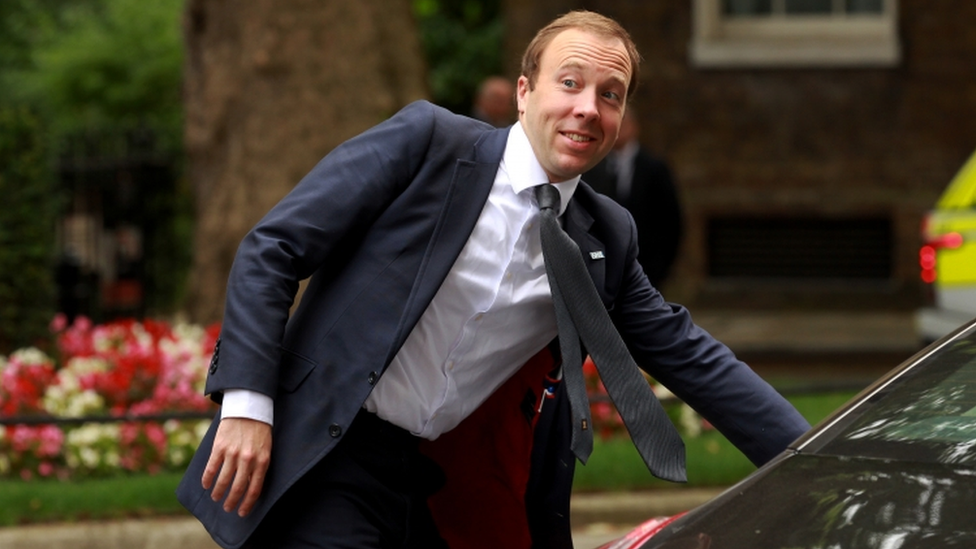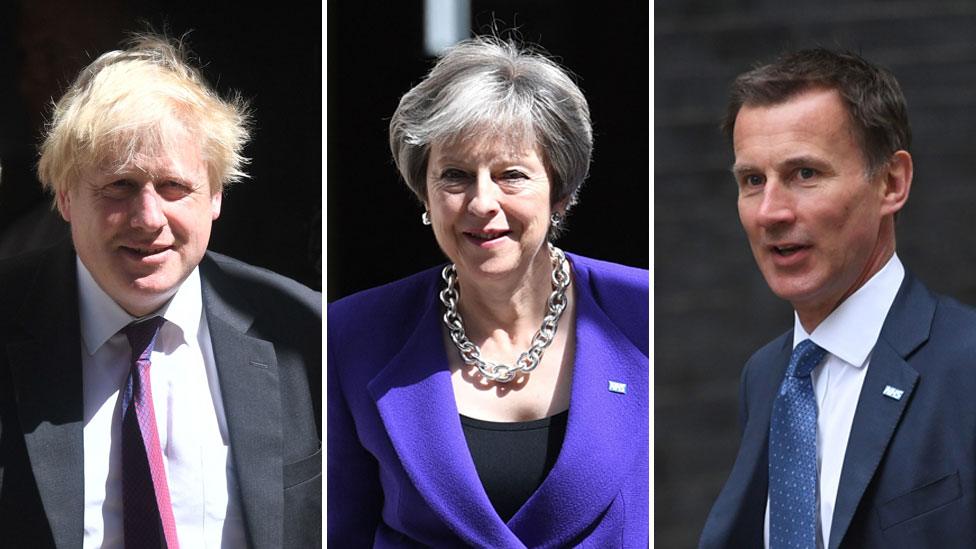New leadership, same old problems
- Published

It's a big deal for the NHS in England after nearly six years with a secretary of state with whom it had become very familiar. Jeremy Hunt was the longest serving health secretary since the post was created. His departure to the Foreign Office is akin to regime change.
Now, the health world will have to tune in to the thinking of his successor, Matt Hancock. So what difference will his arrival make and how will he deal with the unrelenting pressures on the health service and his first winter in the job?
The new health and social care secretary "loves a bit of digital", according to a Whitehall source. Matt Hancock launched his own smartphone app in February, encouraging users to find out about his role as culture secretary and a Suffolk MP and offering "a chance for you to tell me what you think". There will be no shortage of responses from NHS staff and patients now that he has started his new role.
Mr Hancock's enthusiasm for the digital agenda will no doubt be focused on the drive to create a paperless NHS in England by 2023. The original target for the full digitisation of NHS records was 2020 but this was quietly sidelined when critics argued it was too ambitious.
An NHS app allowing GP appointments to be booked and repeat prescriptions to be ordered is due to be launched later in the year. The new secretary of state will be keen to promote it.
NHS purse
So far, so straightforward. The government recently unveiled a new funding package for the NHS in England. Jeremy Hunt quit while he was ahead, having taken credit for pushing the chancellor into allocating 3.4% annual real funding increases, well ahead of the past few years.
But for Mr Hancock, now comes the hard part as he has to try to ensure the money makes a difference on the front line.
Health think tanks argue that the 3.4% is really only enough to cope with rising demand, never mind improving care.
Hospital sources point out that the new money won't come to the NHS until next year.
Nothing extra so far has been allocated for this winter and the intense pressure seen in the first months of this year is likely to be repeated.
There is every chance that waiting lists for routine surgery will get longer and accident and emergency performance won't get better.
Even with the £6bn cash boost next year, there are warnings that there won't be any rapid improvement.
Deep suspicion
NHS Providers, representing health trusts in England, says getting back to the 18-week target for waits for non-urgent surgery will swallow up nearly £1bn a year for three years.
Taking into account all areas of NHS spending, the organisation concludes that "recovering lost ground would take up much if not most of the additional NHS spending, restricting the options for other key priorities".
Mr Hancock, a former Bank of England economist, used to work for George Osborne when he was shadow chancellor.
He is steeped in orthodox Treasury thinking, which includes deep suspicion of pleading by big spending departments.
But now, at Health and Social Care, he is in charge of Whitehall's biggest spender of all, with nearly £130bn a year.
His instincts will be to tell the service to get on with job with the money it has. But that conviction will be tested in the depths of winter if hospitals are struggling to cope.
Cap costs
Mr Hancock still has work to do with the Chancellor Philip Hammond.
The funding deal announced by Theresa May and Jeremy Hunt covers NHS England but not areas such as public health and budgets for training new doctors and nurses.
These budgets were squeezed in the last spending review and the health world will closely scrutinise new agreements set to be announced later this year.
The thorniest problem in Mr Hancock's in-tray is social care. A reform plan for England due this summer was postponed until the autumn.
Ministers, it seemed, did not have the bandwidth to work out both NHS funding plans and policies for social care.
The new secretary of state has to decide how to cap the costs paid by individuals and families and to ensure a fair outcome for all taxpayers.
Private insurance
Richard Humphries, of the King's Fund think tank, has highlighted a blog written by Matt Hancock, external on the Conservative Home website in 2012.
In it, he advocated measures to encourage the private insurance market to allow people to cover future care bills.
"If the government can raise awareness of the potential costs and make attractive policies commercially viable, then we can reduce the cost - a virtuous circle," he wrote.
These thoughts will no doubt be put to him as the date for the social care policy paper draws nearer.
Mr Hunt tweeted that it was a "massive wrench for me to leave health".
He may privately reflect that he has moved on at a good time and that touring the world's capitals and ministries as foreign secretary will be more straightforward than navigating another NHS winter.
Over now to Matt Hancock.
- Published4 June 2018
- Published18 June 2018

- Published26 April 2018
- Published9 July 2018
